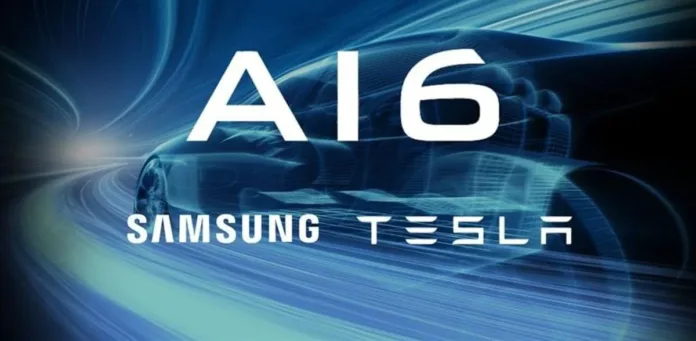The Article Tells The Story of:
- Samsung Clinches a Game-Changing Deal: A $16.5B agreement makes Samsung the key manufacturer for Tesla’s A16 chip through 2033.
- Texas Factory Gets a Lifeline: Samsung’s Taylor fab, once idle, will now produce AI chips for Tesla.
- Musk Takes the Driver’s Seat: Tesla will monitor production directly, with Elon Musk personally overseeing efficiency.
- TSMC Loses Momentum: Samsung’s win breaks TSMC’s streak after securing the A15 chip for Tesla’s FSD.
- AI Chip Race Intensifies: The deal boosts Samsung’s standing in the competitive AI and automotive chip market.
Samsung Strikes $16.5B Deal to Build Tesla A16 Chip
In a major move that reshapes the global chip market, Samsung has secured a $16.5 billion contract to manufacture Tesla’s upcoming A16 AI chip. Elon Musk confirmed the deal publicly on X (formerly Twitter), identifying Samsung as Tesla’s chip partner after a regulatory filing had initially kept the client anonymous.
The long-term contract will last until 2033 and will rely on Samsung’s chip fabrication facility in Taylor, Texas. That plant had been facing serious delays and lack of demand—until now. Musk stated, “Samsung’s giant new Texas fab will be dedicated to making Tesla’s next-generation A16 chip. The strategic importance of this is hard to overstate.”
This manufacturing agreement revives a factory that had appeared stalled just weeks ago. In early July, Samsung pushed back the launch of the Taylor facility to 2026 due to a shortage of clients. The Tesla deal now ensures that the plant will be brought to life, powering next-gen AI chips for one of the biggest names in electric vehicles.
At Squaredtech.co, we see this as more than just a corporate win. This reshapes how chip production, electric vehicle tech, and AI hardware converge—and Samsung is now at the center of it.
Tesla’s Chip Roadmap Shifts Away from TSMC
Tesla currently uses Samsung’s A14 chips in its Full Self-Driving (FSD) platform. However, the follow-up A15 design contract went to TSMC (Taiwan Semiconductor Manufacturing Company), which had been considered the top contender in the space. That chip design was only recently finalized, according to Musk.
But with the A16 chip, Tesla returns to Samsung—marking a shift that could signal waning dominance for TSMC in future Tesla hardware cycles. It’s a bold comeback for Samsung after losing the A15 round, and it comes at a time when the chipmaker has been actively chasing high-value clients for its U.S.-based fabs.
The A16 chip will likely be central to Tesla’s upcoming AI platforms for autonomous driving, robotics, and energy systems. Manufacturing such a critical component in the U.S. allows Tesla to reduce geopolitical risk and streamline collaboration.
Elon Musk appears deeply involved in the process. In a follow-up post on X, he wrote, “Samsung agreed to allow Tesla to assist in maximizing manufacturing efficiency. This is a critical point, as I will walk the line personally to accelerate the pace of progress.”
That means Tesla won’t just receive the chips—it will be actively involved in the production workflow. Musk noted that the Texas factory is located near his home in Austin, giving him direct access to monitor development.
At Squaredtech.co, we believe this hands-on strategy signals a broader trend: tech giants now want more control over their supply chains, even at the manufacturing level.
Samsung’s AI Ambitions Could Threaten TSMC’s Lead
This deal has implications beyond Tesla. It boosts Samsung’s credibility in the high-performance AI chip space—an area where TSMC has held the edge for years. With Nvidia, AMD, and Apple all deeply invested in TSMC’s supply chain, Samsung needs big wins like this to challenge its rival’s global dominance.
And make no mistake: this is a strategic win for Samsung. Securing a decade-long contract with Tesla gives the company a reliable pipeline of work for its Texas factory. It also demonstrates to other U.S.-based companies that Samsung is a viable alternative to TSMC, particularly for cutting-edge AI chip designs.
This partnership might also create ripple effects for other tech sectors, especially those related to autonomous systems and automotive-grade semiconductors. If Samsung successfully delivers A16 chips at scale, it could attract more automotive clients exploring advanced AI features—from real-time object recognition to predictive route mapping.
From the Squaredtech.co perspective, this deal does more than revive a delayed fab—it shifts the AI chip power map. It suggests that innovation partnerships are moving closer to home, with manufacturers like Samsung betting big on U.S.-based infrastructure and tighter client integration.
Final Thoughts from Squaredtech
Samsung’s $16.5 billion deal with Tesla is more than a contract—it’s a tech milestone. It transforms a dormant factory in Texas into a central hub for AI chip production. It repositions Samsung as a serious competitor to TSMC in advanced chipmaking. And it shows that Tesla wants more than supply—it wants control, speed, and proximity.
The A16 chip will be critical to Tesla’s future AI platforms, and its success may open doors for Samsung to become the go-to AI chip manufacturer in the U.S.
At Squaredtech.co, we’ll be watching how this partnership develops—and how it affects the broader semiconductor industry. Whether it’s a win for Samsung, Tesla, or both, one thing is clear: the AI chip race just got a lot more competitive.
Stay Updated: Tech News


